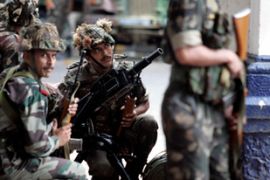Siege ends at Mumbai’s Taj hotel
Indian security forces have taken control of building from armed men, city’s police chief says.

Among the foreigners who have died are five Israelis, two Americans, two French nationals, two Australians, a German, a Japanese, a Canadian, a British Cypriot, an Italian and a Singaporean.
Police said that the attacks had been carried out by 10 people who had travelled to Mumbai, police said.
“Ten people had come, we killed nine and one has been captured alive,” Gafoor said.
Final operation
At least three attackers and one security officer were killed in Saturday’s final raid at the Taj Mahal hotel, Jyoti Krishna Dutt, the country’s commando chief, said.
| In depth |
|
|
“Our operations will continue until we check each and every room and floor,” he said.
Sniffer dogs were later taken into the hotel as security forces made a final sweep through the rooms of the building.
James Bays, Al Jazeera’s correspondent at the scene, said some Indian news journalists had been allowed into the hotel amid the clean-up operations.
“The media have been allowed a lot closer to the hotel to see what has gone on here. When you look up close you can really see the kind of battle that has taken place here. You can see glass on the ground, bullet holes … parts of the hotel are burnt out,” he said.
“This is a very large hotel, with 600 rooms for guests. I’m told that the back half of the hotel is a real maze and security forces are going through the building to clear every room. This will be a long and painstaking task.”
Nariman House siege
A day earlier, security forces took control of Mumbai’s Jewish centre, Nariman House, after exchanging gunfire with attackers inside the building.
Troops found the bodies of six hostages inside the building after killing the men who had stormed the Jewish centre.
Al Jazeera’s Matt McClure, reporting from outside Nariman House, said several armed men were killed in the assault by security forces.
Among the bodies recovered from Nariman House were those of Rabbi Gavriel Noach Holtzberg, who ran the centre, and his wife, the Chabad Lubavitch organisation said.
Their two-year-old son had earlier managed to escape and is now in the care of his grandparents.
Security forces at another hotel, the Trident-Oberoi, found 24 bodies after gaining control of the building on Friday.
Attackers ‘remorseless’
Describing security operations inside the Taj Mahal hotel, the chief of India’s marine commando force said: “The [attackers] were the kind of people with no remorse – anybody and whomsoever came in front of them, they fired.
 |
| The Taj hotel was the last building to fall into the hands of Indian security forces [Reuters] |
“We could have got those terrorists but for so many hotel guests … The bodies were lying strewn here and there. There was blood all over and in trying to avoid the casualty of those civilians, we had to be that much more careful,” he said.
Ratan Tata, the Indian business baron who runs the company that owns the hotel, said the attackers had detailed knowledge of the layout of the buildings.
The strikes by small bands of armed men starting on Wednesday night shocked Mumbai, the nerve-centre of India’s growing economic might and home to the Bollywood film industry.
Pointing the finger
The Indian media, citing unidentified police investigators, reported that three alleged attackers had confessed to being members of Lashkar-e-Tiyaba, a Pakistan-based group which aims to end Indian rule in Kashmir.
Lashkar-e-Tiyaba had earlier denied any role in the attacks.
Earlier, a little known group calling itself the Deccan Mujahidin claimed responsibility for the attack in emails to news organisations.
In a speech on Thursday, Manmohan Singh, the Indian prime minister, blamed “external forces”, a phrase sometimes used to refer to Pakistan-based fighters.
RK Raghavan, a former chief of India’s Central Bureau of Investigation, pointed to claims that the police have seized a mobile phone which the “terrorists” used for communication with unidentified contacts in Pakistan.
“I think there is irrefutable evidence that elements which have been giving sanctuary in Pakistan are responsible,” he said.
“Presumably, initial evidence is that they have been in touch with anti-Indian elements who may or may not have any links to the Pakistani government. These elements are probably acting on their own, but they have been given a lot of freedom to move around in Pakistan.”
Raghav also named Pakistan and Bangladesh as nursing grounds for al-Qaeda-influenced groups.
Pakistani reaction
For its part, Pakistan has condemned the attacks and said it will fully co-operate with an Indian investigation.
 |
| Fresh commando raids early on Saturday ended the siege of the Taj Mahal hotel [EPA] |
However, Islamabad has abandoned its earlier decision to send the head of the Inter-Services Intelligence directorate to India.
“A spokesman of the Prime Minister’s House has said that a representative of ISI will visit India instead of the Director General of the ISI to help in investigating the Mumbai terrorism incident,” a government statement, released on Saturday, said.
The Associated Press reported on Friday that US officials and Indian diplomats were working out details for the departure of a team of FBI agents to join the investigation into the attacks.
In a diplomatic exchange that raised the prospect of renewed tension between India and its neighbour, Pranab Mukherjee, the Indian foreign minister, urged Pakistan to dismantle what he called the infrastructure that supported armed groups.
Al Jazeera’s Kamal Hyder, reporting from Islamabad, said: “More and more people here are inclined to think that this is an indigenous, internal Indian phenomenon and that India is scapegoating Pakistan.
“The Indian media have insinuated that elements within Pakistan were involved,” he said.
“However, on the Pakistani side there has been relative quiet and also a sense of responsibility shown by the journalists not to jump to conclusions.”

 Timeline of Mumbai attack
Timeline of Mumbai attack